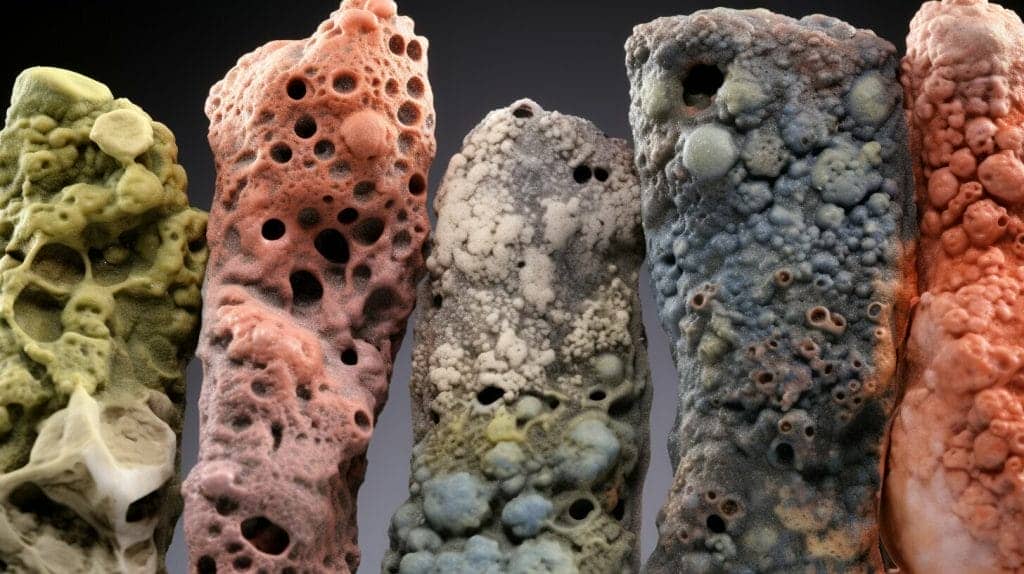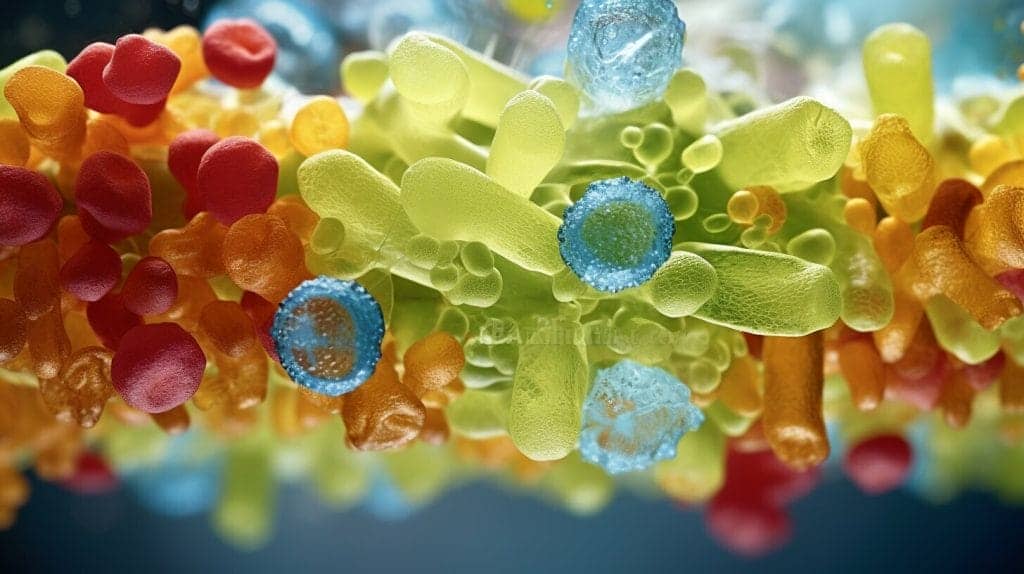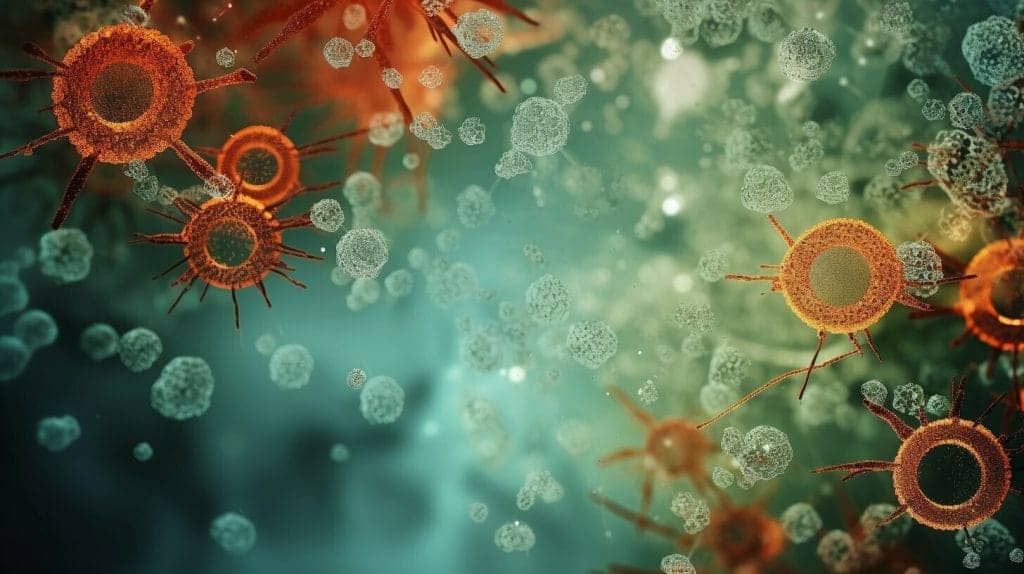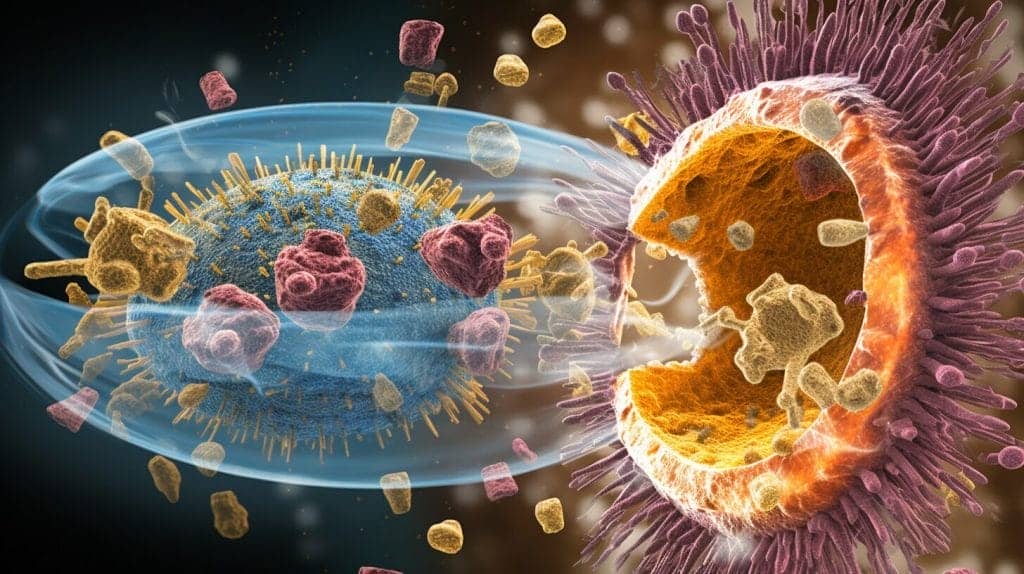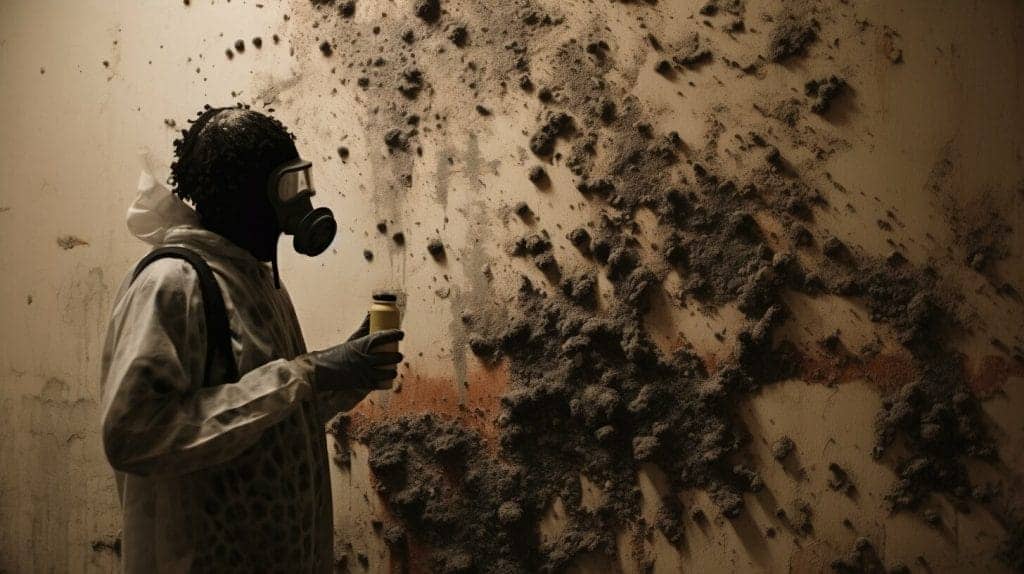Mold is a common type of fungus that grows in moist environments and can be found in both indoor and outdoor spaces. While most molds are harmless, certain types produce toxins that can have a range of negative effects on human health. One of these effects is histopathological changes, which refers to alterations in the structure and function of body tissues.
Exposure to mold toxins can cause significant histopathological changes in various organs and systems within the body, leading to a range of health problems. It is important to understand these changes for effective prevention and treatment of mold toxicity.
Key Takeaways:
- Mold toxins can cause histopathological changes in the body.
- Understanding these changes is important for prevention and treatment of mold toxicity.
- The impacts of mold toxins on human health can be significant.
Understanding Mold Toxins and Their Effects on Histopathology
Mold toxins can have a significant impact on histopathology, which is the study of changes in bodily tissues at a microscopic level. When exposed to mold toxins, individuals may experience histological damage and a range of associated symptoms. Studies have shown that exposure to mold toxins can lead to histopathological alterations in various organs and systems within the body.
The effects of mold toxins on histopathology are complex and can vary depending on the type of mold, duration of exposure, and individual susceptibility. However, there are some common findings that have been observed in individuals exposed to mold toxins. These include inflammation, fibrosis, necrosis, and cellular atypia.
Inflammation is a common response to mold toxins, which can lead to tissue damage and impaired functioning. Fibrosis, or scarring of the tissue, can also occur over time, which can impede normal organ function. Necrosis refers to the death of cells or tissues and can occur due to toxic effects of mold toxins. Cellular atypia, or abnormal cellular changes, can also be observed in response to mold toxin exposure.
These histopathological findings can have significant impacts on overall health and well-being. For example, inflammation and fibrosis in the lungs can lead to respiratory issues such as asthma and chronic obstructive pulmonary disease (COPD). Necrosis and cellular atypia in other organs can contribute to a range of health conditions, including autoimmune disorders, neurological disorders, and cancer.
It is crucial to understand the effects of mold toxins on histopathology in order to develop effective prevention and treatment strategies. By addressing mold infestations and improving indoor air quality, individuals can help reduce their risk of exposure to mold toxins and associated histopathological changes. Holistic approaches to mold toxicity treatment, such as those offered at Oasis Medical Institute, can also help address histopathological changes and promote overall health and well-being.
Common Histopathological Changes Caused by Mold Exposure
Exposure to mold toxins can cause a variety of histopathological changes in different tissues and organs of the body. These alterations can range from mild to severe, depending on the duration and intensity of exposure.
One of the most common histopathological changes observed in individuals exposed to mold toxins is tissue inflammation. This is caused by the release of pro-inflammatory cytokines, which can lead to tissue damage and dysfunction. In addition, mold toxins can contribute to oxidative stress and DNA damage, further exacerbating histological damage.
The respiratory system is particularly vulnerable to the effects of mold toxins. Inhalation of mold spores can trigger a range of respiratory symptoms, such as coughing, wheezing, and shortness of breath. Prolonged exposure to mold toxins can also lead to the development of chronic respiratory conditions, such as asthma or chronic obstructive pulmonary disease (COPD).
Mold toxins can also cause histopathological changes in the central nervous system (CNS). Studies have shown that exposure to mold toxins can lead to cognitive impairment, such as memory loss and difficulty concentrating. Mold toxins can also contribute to the development of neurological disorders, such as multiple sclerosis and Parkinson’s disease.
The immune system can also be negatively impacted by mold toxins. Exposure to mold toxins can lead to immune system dysfunction, such as increased susceptibility to infections and autoimmune disorders. Histopathological changes in immune-related tissues, such as the spleen and lymph nodes, have also been observed in individuals exposed to mold toxins.
Overall, the histopathological changes caused by mold toxins can lead to significant health problems if left untreated. It is essential to address mold infestations and take proactive measures to improve indoor air quality to prevent further damage to tissues and organs affected by mold toxicity.
The Impact of Mold Toxins on Human Health
Mold toxins can have a significant pathological impact on human health, leading to various histopathological alterations. When these toxins are inhaled or ingested, they can enter the bloodstream and travel to different organs and systems, causing damage at the cellular level.
The specific histopathological findings in mold toxin exposure can vary depending on the type of mold and the duration of exposure. Some of the most common alterations include inflammation and fibrosis in the respiratory system, damage to the nervous system, and immune system dysfunction.
Mold-induced histopathological alterations can lead to a range of health conditions, including respiratory issues such as asthma and chronic obstructive pulmonary disease (COPD), neurological disorders such as multiple sclerosis and Parkinson’s disease, and immune system dysfunction such as autoimmune disorders and allergies.
It is important to note that the effects of mold toxins on histopathology can be long-lasting and cumulative, meaning that prolonged exposure can lead to more severe and chronic health issues.
As such, it is essential to address mold infestations promptly and implement effective mold prevention measures to mitigate the risk of exposure to mold toxins. Additionally, seeking comprehensive treatment for mold toxicity that addresses not only the histopathological changes but also the underlying factors contributing to the toxicity can lead to improved health outcomes.
Prevention of Histopathological Changes from Mold Toxins
Mold exposure can lead to a variety of histopathological changes in the body, which is why prevention is key. By addressing the underlying causes of mold growth and taking steps to improve indoor air quality, individuals can reduce their risk of developing these alterations.
One common histopathological change associated with mold exposure is tissue damage. This can affect various organs and systems within the body, including the respiratory system, immune system, and nervous system. Other changes may include inflammation, fibrosis, and necrosis.
To prevent these changes from occurring, it is important to address any mold infestations in the home or workplace. This may involve conducting regular inspections for mold growth, reducing humidity levels, and fixing any leaks or water damage as soon as possible.
Improving indoor air quality is also essential for preventing histopathological changes from mold toxins. This can be achieved by using air purifiers, maintaining adequate ventilation, and avoiding the use of harsh chemicals and cleaning products that can contribute to poor air quality.
Implementing effective mold prevention measures in both residential and commercial settings can significantly reduce the risk of histopathological changes caused by mold toxins. By taking a proactive approach to mold prevention and staying vigilant for signs of mold growth, individuals can protect their health and well-being.
Treatment of Histopathological Changes from Mold Toxins
When it comes to treating histopathological changes caused by mold toxins, there are several approaches available. Conventional treatments may involve the use of antifungal medications, steroids, or other pharmaceuticals to alleviate symptoms and address underlying issues.
However, an integrative and holistic approach to mold toxicity treatment can provide numerous benefits for individuals experiencing histological alterations as a result of mold exposure. At Oasis Medical Institute in Tijuana, MX, Dr. Francisco Contreras offers a comprehensive and personalized approach that considers the whole person, including both physical and emotional factors that may contribute to mold toxicity and associated histopathological changes.
Oasis Medical Institute’s Holistic Mold Toxicity Treatment Program
Dr. Contreras’s holistic Mold Toxicity treatment program combines conventional medical treatments with various complementary therapies and lifestyle modifications to support the body’s natural healing processes. This program includes:
| Comprehensive Medical Evaluation and Testing | Dr. Contreras conducts a thorough evaluation to determine the extent of mold toxicity and associated histopathological changes, as well as any underlying factors that may contribute to the condition. |
|---|---|
| Individualized Treatment Plan | Based on the evaluation results, Dr. Contreras creates a personalized treatment plan that may include conventional medical treatments, such as antifungal medications, as well as complementary therapies such as intravenous vitamin C, ozone therapy, and mind-body techniques. |
| Lifestyle Modifications | Dr. Contreras may recommend changes to the individual’s diet and environment, as well as appropriate exercise and stress management techniques, to support the healing process and prevent further damage. |
The Role of Holistic Medicine in Addressing Mold Toxin Effects on Histopathology
By taking a holistic approach to mold toxicity treatment, Dr. Contreras addresses not only the physical symptoms and histopathological changes caused by mold exposure but also the underlying emotional and environmental factors that can contribute to the condition. This approach provides a more comprehensive and effective solution for individuals experiencing the harmful effects of mold toxins on histopathology.
Ultimately, by providing personalized care that considers the whole person, Dr. Contreras and his team at Oasis Medical Institute can help individuals experiencing histological alterations caused by mold toxins regain their health and vitality.
Oasis Medical Institute: Holistic Mold Toxicity Treatment Program
For those experiencing histopathological changes caused by mold toxins, a holistic approach to treatment can offer significant benefits. The holistic Mold Toxicity treatment program at Oasis Medical Institute in Tijuana, MX is specifically designed to address the tissue pathology and damage caused by mold toxins, treating the whole person, not just the symptoms.
At Oasis Medical Institute, the team of experts works together to provide a comprehensive treatment plan that includes a wide range of therapeutic modalities. This includes conventional medicine, alternative therapies, and healthy lifestyle interventions to help patients achieve optimal health and wellness.
| Treatment Modalities | Description |
|---|---|
| Conventional Medicine | Conventional medicine is used to address acute symptoms and prescribe medications when necessary. |
| Alternative Therapies | A variety of alternative therapies, including acupuncture and homeopathy, are used to complement conventional treatments and promote natural healing. |
| Lifestyle Interventions | Healthy lifestyle interventions, such as nutrition counseling, stress management, and physical therapy, are used to support overall wellness and help patients achieve their health goals. |
The holistic approach taken at Oasis Medical Institute recognizes that mold toxicity is not just a surface-level issue, but a deep-seated problem that requires a comprehensive solution. By addressing all aspects of patients’ health, including their physical, emotional, and spiritual needs, the team at Oasis Medical Institute is able to provide a more personalized and effective treatment plan.
For those experiencing histopathological changes caused by mold toxins, the holistic Mold Toxicity treatment program at Oasis Medical Institute represents a unique and powerful approach to healing. By taking a comprehensive view of patients’ health and using a wide range of therapeutic modalities, the team at Oasis Medical Institute is able to provide a path forward to wellness and a life free from the damaging effects of mold toxins.
The Role of Holistic Medicine in Mold Toxicity Treatment
While conventional medicine often focuses on treating specific symptoms or diseases, holistic medicine takes an integrative approach to health and wellness. In the context of mold toxicity treatment, this means addressing not just the histopathological changes caused by mold exposure, but also the underlying factors contributing to the individual’s overall health and well-being.
At Oasis Medical Institute, their holistic Mold Toxicity treatment program takes a comprehensive approach to care. Along with conventional treatments such as medication and supportive therapies, they also offer complementary therapies like acupuncture and massage to support the individual’s physical and emotional healing.
Holistic medicine also emphasizes the importance of lifestyle modifications and self-care practices, which can be key in preventing and treating histopathological changes caused by mold toxins. These may include:
- Eating a balanced and nutritious diet
- Staying hydrated and avoiding alcohol and caffeine
- Exercising regularly and getting plenty of rest
- Practicing stress-reduction techniques like meditation and yoga
By taking a holistic approach to mold toxicity treatment, individuals can address the root causes of their histopathological changes and promote overall wellness and longevity.
Booking a Consultation at Oasis Medical Institute
To take the next step in addressing histopathological changes caused by mold toxins, readers can book a consultation at Oasis Medical Institute for their holistic Mold Toxicity treatment program. The program is designed to address the root causes of mold toxicity and promote overall wellness.
The holistic Mold Toxicity treatment program at Oasis Medical Institute takes a comprehensive approach to mold toxicity treatment, combining conventional and alternative therapies with other therapeutic modalities. By addressing underlying factors such as immune system dysfunction, detoxification, and overall wellness, the program aims to support and enhance the body’s natural healing processes.
Individuals can book a consultation by calling the institute’s phone number or completing an online form on their website. During the consultation, a team of experienced medical professionals will perform a thorough evaluation and develop a personalized treatment plan tailored to the individual’s unique needs and circumstances.
Through the holistic Mold Toxicity treatment program at Oasis Medical Institute, individuals can take the proactive steps necessary to address their histopathological changes caused by mold toxins and promote optimal health and well-being.
Latest Insights for Prevention and Treatment of Histopathological Changes
As researchers continue to study the effects of mold toxins on human health, new insights are emerging regarding the prevention and treatment of histopathological changes caused by mold exposure.
One recent study published in the Journal of Environmental and Public Health found that certain dietary interventions, such as increasing antioxidant intake and reducing sugar consumption, may be helpful in mitigating the tissue damage caused by mold toxins. Additionally, the study suggested that regular exercise and stress reduction techniques may also be beneficial in reducing the harmful effects of mold exposure on the body.
Other research has focused on the use of natural remedies and plant-based therapies for treating histopathological changes caused by mold toxins. For example, studies have shown that supplements such as curcumin, quercetin, and resveratrol may help to reduce inflammation and promote healing in individuals with mold toxicity.
In terms of prevention, experts recommend taking proactive measures to control moisture and prevent mold growth in indoor environments. This may include using dehumidifiers, repairing leaks promptly, and ensuring adequate ventilation in bathrooms and kitchens.
Overall, staying informed and implementing strategies for both prevention and treatment can be essential for minimizing the damaging effects of mold toxins on histopathology and promoting optimal health and well-being.
The Importance of Addressing Histopathological Changes from Mold Toxins
Ignoring histopathological changes from mold toxins can have serious consequences on an individual’s health and well-being. The effects of mold toxins on histopathology can lead to a host of health conditions and symptoms, including respiratory issues, neurological disorders, and immune system dysfunction.
If left untreated, the damage caused by mold toxins can accumulate over time and result in long-lasting health problems. It is important to address histopathological changes caused by mold toxins as early as possible to prevent further damage and promote optimal health.
Recognizing the histological alterations caused by mold exposure is essential for early intervention and comprehensive treatment. By understanding the specific histopathological findings in mold toxin exposure, individuals can take steps to minimize further damage and seek appropriate treatment.
Effective treatment for histopathological changes from mold toxins requires a comprehensive approach that addresses all underlying factors. This may include immune system dysfunction, detoxification, and overall wellness.
Book a consultation at Oasis Medical Institute for holistic Mold Toxicity treatment and take the next step in addressing your histopathological changes caused by mold toxins.
Exploring Holistic Approaches to Mold Toxicity Treatment
While traditional medical treatments for mold toxicity can be effective, they often focus solely on symptom relief and fail to address the underlying causes of histopathological changes from mold toxins. As such, many individuals are turning to holistic approaches that take a more comprehensive view of health and well-being.
One of the most effective holistic approaches to mold toxicity treatment is offered at Oasis Medical Institute’s holistic Mold Toxicity treatment program. This program integrates the best of conventional medicine with therapies and services that promote overall wellness and healing.
| Complementary Therapies | Lifestyle Modifications |
|---|---|
|
|
These complementary therapies and lifestyle modifications can support the body’s natural healing processes and help to mitigate the histopathological changes caused by mold toxins. For example, acupuncture can help to reduce inflammation and pain, while massage therapy can improve blood flow and lymphatic drainage. Nutritional counseling can ensure that the body is receiving the nutrients it needs to support the healing process, and supplemental therapy can help to address any nutrient deficiencies that may contribute to histological damage.
Meanwhile, detoxification protocols can help the body to eliminate mold toxins and other harmful substances, while stress management techniques can help to reduce the impact of stress on the immune system. Sleep hygiene optimization can improve the body’s ability to repair and regenerate itself, while exercise and movement therapies can promote overall physical and mental health.
This integrative approach to mold toxicity treatment recognizes that histopathological changes are not just physical, but can also be emotional, mental, and spiritual in nature. By addressing all aspects of health and well-being, this approach can help individuals to achieve optimal health and healing.
Conclusion
Overall, understanding histopathological changes caused by mold toxins is crucial for preventing and treating the damaging effects of mold exposure. Mold toxins can cause significant damage to various organs and systems within the body, leading to respiratory issues, neurological disorders, and immune system dysfunction.
Fortunately, there are steps that individuals can take to prevent these changes, including addressing mold infestations, improving indoor air quality, and implementing effective mold prevention measures in both residential and commercial settings.
For those already experiencing histopathological changes from mold toxins, seeking comprehensive and holistic treatment is essential. The holistic Mold Toxicity treatment program offered at Oasis Medical Institute takes an integrative approach to treatment, addressing underlying factors such as immune system dysfunction, detoxification, and overall wellness.
By staying informed of the latest insights and developments in the prevention and treatment of histopathological changes caused by mold toxins, individuals can take a proactive approach to their health and well-being. Don’t wait until it’s too late – book a consultation at Oasis Medical Institute today to begin your journey towards optimal health.
FAQ
Q: What are histopathological changes?
A: Histopathological changes refer to alterations or abnormalities observed in the microscopic structure and composition of tissues and organs. These changes can occur as a result of various factors, including exposure to mold toxins.
Q: How do mold toxins cause histopathological changes?
A: Mold toxins can cause histopathological changes by damaging and disrupting the normal structure and function of tissues. These toxins can trigger inflammation, oxidative stress, and other mechanisms that lead to cellular damage and tissue pathology.
Q: What are the common histopathological changes caused by mold exposure?
A: Common histopathological changes caused by mold exposure include inflammation, fibrosis, necrosis, and cellular abnormalities. These changes can occur in various organs and systems, such as the respiratory system, central nervous system, and immune system.
Q: How do mold toxins impact human health?
A: Mold toxins can have a significant impact on human health. The histopathological alterations caused by these toxins can contribute to respiratory issues, neurological disorders, immune system dysfunction, and other health conditions and symptoms.
Q: What can be done to prevent histopathological changes from mold toxins?
A: To prevent histopathological changes from mold toxins, it is important to address mold infestations, improve indoor air quality, and implement effective mold prevention measures. Regular inspections, proper ventilation, and prompt remediation of mold issues are key prevention strategies.
Q: What treatment options are available for histopathological changes from mold toxins?
A: Treatment options for histopathological changes from mold toxins may include conventional approaches such as medications and therapies, as well as alternative and holistic treatments. It is important to address the underlying factors contributing to mold toxicity and promote overall wellness.
Q: What is the holistic Mold Toxicity treatment program at Oasis Medical Institute?
A: Oasis Medical Institute offers a holistic Mold Toxicity treatment program that integrates conventional medicine with complementary therapies. Their approach includes individualized treatment plans, detoxification protocols, immune system support, and lifestyle modifications to address histopathological changes caused by mold toxins.
Q: What is the role of holistic medicine in mold toxicity treatment?
A: Holistic medicine plays a crucial role in mold toxicity treatment by addressing the underlying factors contributing to histopathological changes. It focuses on promoting overall wellness, optimizing immune function, and supporting the body’s natural healing processes.
Q: How can I book a consultation at Oasis Medical Institute?
A: To book a consultation at Oasis Medical Institute for their holistic Mold Toxicity treatment program, you can contact them directly through their website or by calling their provided contact details. Their team will guide you through the process and provide further information.
Q: What are the latest insights for prevention and treatment of histopathological changes?
A: The field of mold toxicity research is continuously evolving, and new insights and developments are constantly emerging. Staying informed about the latest research findings, innovative approaches, and strategies for prevention and treatment is crucial for addressing histopathological changes caused by mold toxins.
Q: Why is it important to address histopathological changes from mold toxins?
A: Addressing histopathological changes from mold toxins is important to minimize further damage and prevent potential long-term consequences. Early intervention and comprehensive treatment are essential for optimal health and well-being in individuals exposed to mold toxins.
Q: What are some holistic approaches to mold toxicity treatment?
A: In addition to conventional treatments, holistic approaches to mold toxicity treatment may include complementary therapies such as acupuncture, herbal medicine, nutritional therapy, and stress management techniques. Lifestyle modifications, including dietary changes and environmental modifications, can also support the healing process.
Dr. Francisco Contreras, MD is a renowned integrative medical physician with over 20 years of dedicated experience in the field of integrative medicine. As the Medical Director of the Oasis of Hope Hospital in Tijuana, Mexico, he has pioneered innovative treatments and integrative approaches that have been recognized globally for the treatment of cancer, Lyme Disease, Mold Toxicity, and chronic disease using alternative treatment modalities. Dr. Contreras holds a medical degree from the Autonomous University of Mexico in Toluca, and speciality in surgical oncology from the University of Vienna in Austria.
Under his visionary leadership, the Oasis of Hope Hospital has emerged as a leading institution, renowned for its innovative treatments and patient-centric approach for treating cancer, Lyme Disease, Mold Toxicity, Long-Haul COVID, and chronic disease. The hospital, under Dr. Contreras's guidance, has successfully treated thousands of patients, many of whom traveled from different parts of the world, seeking the unique and compassionate care the institution offers.
Dr. Contreras has contributed to numerous research papers, articles, and medical journals, solidifying his expertise in the realm of integrative medicine. His commitment to patient care and evidence-based treatments has earned him a reputation for trustworthiness and excellence. Dr. Contreras is frequently invited to speak at international conferences and has been featured on CNN, WMAR2 News, KGUN9 News, Tyent USA, and various others for his groundbreaking work. His dedication to the medical community and his patients is unwavering, making him a leading authority in the field.
Contreras has authored and co-authored several books concerning integrative therapy, cancer, Lyme Disease and heart disease prevention and chronic illness, including "The Art Science of Undermining Cancer", "The Art & Science of Undermining Cancer: Strategies to Slow, Control, Reverse", "Look Younger, Live Longer: 10 Steps to Reverse Aging and Live a Vibrant Life", "The Coming Cancer Cure Your Guide to effective alternative, conventional and integrative therapies", "Hope Medicine & Healing", "Health in the 21st Century: Will Doctors Survive?", "Healthy Heart: An alternative guide to a healthy heart", “The Hope of Living Cancer Free”, “Hope Of Living Long And Well: 10 Steps to look younger, feel better, live longer” “Fighting Cancer 20 Different Ways”, "50 Critical Cancer Answers: Your Personal Battle Plan for Beating Cancer", "To Beat . . . Or Not to Beat?", and “Dismantling Cancer.”

